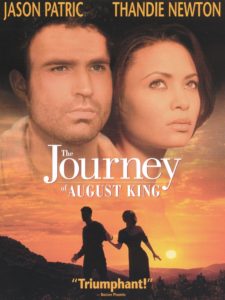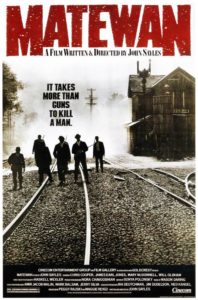In Movie-Made Appalachia: History, Hollywood, and the Highland South, author John C. Inscoe writes that he was pleasantly surprised when he taught a course at the University of Georgia, showing and discussing a dozen films about race and racism in the Southern Mountains.
In particular, Inscoe has a compelling section on African Americans in the Southern Appalachia, and he does not shy away from discussing the persistent strain of racism. This area is one of Inscoe’s subjects of scholarly expertise, as shown in books like Appalachians and Race: The Mountain South from Slavery to Segregation, and many essays.
While only a small percentage of highlanders were African American, perhaps 15 percent, they were a presence, especially among West Virginia’s coal miners. There were relatively few slaves, mostly household servants and farm hands, and equally few slaveholders.
The Journey of August King
One of Inscoe’s favorites cinematic representations is the 1971 novel and subsequent film, The Journey of August King, by Asheville native John Ehle. The story, set in 1815, tells of an escaped slave, a young woman assisted in her flight, at great personal risk, by a white mountain man.

The 1995 television film stars Thandiwe Newton and Jason Patric, with narration by Maya Angelou and a script by Ehle. It is “exceptional,” Inscoe writes, “one of the most sensitive and sophisticated treatments of slavery and anti-slavery sentiments ever portrayed in a feature film.”
It is, he writes, “easily among the most serious and historically accurate depictions of the antebellum mountain South ever put on screen.”
“To have so compelling, if relatively unexplored, a part of the Appalachian experience portrayed with as much talent, sensitivity, and integrity, as is evident in The Journey of August King, is commendable, particularly in light of how rarely feature films have sought to explore any aspect of race relations in the mountain South.”
African American Characters in Film
African American characters appear in a number of films that Inscoe likes (and that are among my own favorites), including James Earl Jones in John Sayles’ Matewan (1987). Jones’ actor father Robert appeared in Wild River. African Americans appeared in small parts in Cold Mountain (2003), with a sequence that seems to cover the Shelton Laurel Massacre, about which Inscoe has also written.

Next week, I’ll continue this series with part three, “To See Ourselves as Others See Us:” Appalachian Women and Others.
For information about my upcoming book tour, click here. Check back often for added details!
To learn more about my career as a writer, check out my recent interview with The Authors Guild.
Follow me on Facebook, Twitter, and Instagram to learn more. The quickest way to reach me is by email: osopinsky@gmail.com.